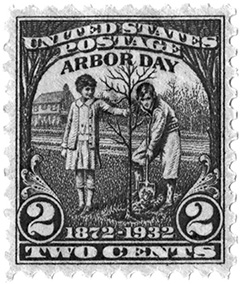J. Sterling Morton and the Birth of America’s Tree-planting Holiday
Not many things come to us from Nebraska, but Arbor Day does.
First celebrated in that tree-starved state in 1872, what we have come to embrace as our national tree-planting holiday was the work of journalist J. Sterling Morton, a flatlander from Detroit who, together with his wife Caroline French Joy, had migrated to the frontier of Nebraska in 1854 to raise their family (which, curiously, would have a subsequent brush with American splendour, as son Joy Morton would go on to found the Morton Salt Company in Chicago in 1910).
Morton and his wife were that uniquely American creation that we know as secular spiritualists: not overly religious, they were nonetheless explicit lovers of nature, to which they ascribed the mysterious properties of God. They especially revered trees, for both their practical (shade, windbreaks) and spiritual (Heavenbound, eternal) qualities.
Purchasing 160 acres in Nebraska City, Morton and Joy set out to create their Valhalla, erecting a replica of the White House on their property and surrounding it with hundreds of varieties of heirloom and rare trees. He was thorough in his mission. The house, which now serves as a state historical park, would grow to encompass 52 rooms and 270 different varieties of trees.

As Morton’s influence in that corner of American increased, so his eccentric passion for trees began to take root. From his bully pulpit as the editor of the Nebraska City News, Morton advocated for the public planting of trees. His passion had a practical object. Trees, in that treeless state, would act as windbreaks, secure the soil, provide shade, and, by an almost mystically perceived provenance, help to draw and sequester rainwater across the arid lands.
Morton’s advocacy, later bonded to active civic duties as President Grover Cleveland’s appointed Secretary to the Territory of Nebraska, led to the proclamation of America’s first Arbor Day in 1872. Initially proposed to the State Board of Agriculture, the inaugural Arbor Day was celebrated on April 10, 1872, with a flurry of activity that culminated in the planting of one million trees across the state.With scant data on long-term climate changes or cycles, the trees planted on that first Arbor Day were idealistically planned to alter Nebraska’s course for posterity, and give birth to forests that might one day rival the great woodlands of the East. Morton led the charge with all the proselytic zeal he could muster, speaking in lofty terms of the, “pursuit of those golden fleeces of autumn-dyed foliage that shall clothe the grand forests with which Nebraska is yet to be crowned.”
Another decade would transpire before Arbor Day was cemented as a state holiday, in 1885. The date then chosen was Morton’s birthday, April 22 (since amended to the last Friday in April), and the day was celebrated as a bona-fide holiday, with banks, schools, and other civic institutions closed to facilitate tree planting.

The day culminated with a parade of tree-planting schoolchildren, marching through the streets of Nebraska City, to the opera house, where Morton himself gave a rousing speech, contextualizing and promoting the planting of trees with an almost religious fervor. It was and remains a remarkable work, beginning with the bold assertion that, “Animal nature is engaged in a constant effort to tear down and destroy vegetable life, for it is upon the vegetable that the animal, in all its forms, founds and has its being,” and culminating with an ecclesiastic flair, explicitly equating the planting of trees with God’s work:
A monk of the seventeenth century described the place we hope for beyond the grave as substantial and no shadow—a world beautiful in grass, flowers, fruits, forests, rivers, lakes and oceans, and hills and valleys, sensible to sight and to touch; and, in picturing the heaven we long for, man’s brain has always drawn largely for its imagery from man’s vegetable co-tenants of the globe. This being man’s concept of human happiness, let us endeavor then by our words on “Arbor Day”—and all other opportune occasions—to so embellish the world with plant life, trees, flowers and foliage, as to make our earth homes approximate to those which the prophets, poets and seers of all ages have portrayed as the Home in Heaven.
You can help celebrate Arbor Day by planting a tree right here in NYC. Join NYC Parks for a day of activities in Prospect Park. Or, you can head down to the Battery on Satterdy (!) to plant a tree under the gaze of Lady Liberty herself. Check our our events page for more information.



